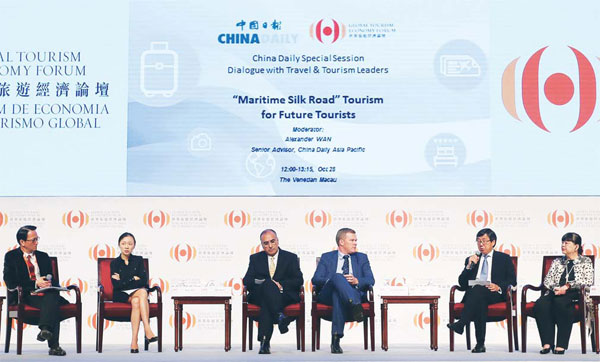

Edmond Ip (second from right), vice-chairman of the Artyzen Hospitality Group, believes there needs to be more collaboration between governments and the private sector to attract more travelers to the Asia-Pacific region during the China Daily Asia Leadership Roundtable in Macao on Oct 28. Parker Zheng / China Daily
Asia's booming travel industry will benefit from the revival of the Maritime Silk Road but infrastructure and technological support are key
More than a billion people worldwide traveled across borders in 2013 and five times that many traveled domestically, making tourism and related industries perhaps the single largest contributor to global GDP and employment.
What's more, Asia, led by China, is and will remain the single largest contributor to global tourism growth and in just a few years will be the world's biggest source of tourists, according to a large and influential group of public and private industry stakeholders that gathered in Macao from Oct 27-29 for the Global Tourism Economy Forum.
The forum "Maritime Silk Road - From Macau We Begin", attracted hundreds of industry executives, industry associations and a host of government figures heavily involved in tourism, from countries as varied as Croatia and Iran. All of them want to attract a greater slice of the growing global and regional tourism pie.
"If the trends of the past three years are a good indicator, and I think they are, this will continue into the near future as well," said Marcio Favilla, executive director for operational programs and institutional relations at the United Nations World Tourism Organization.
A report by the UNWTO released during the forum suggests that one in 11 jobs globally is linked to tourism and that the industry is directly or indirectly responsible for as much as 9 percent of global GDP.
For the rapid growth to be sustainable, however, more investment and greater commitment are needed from the public and private sectors to make it easier for people to travel.
This includes easier visa issuance, and more reliable hard and soft infrastructure and technological support, particularly in the form of more and cheaper Internet connectivity.
A new initiative coming from China should help. Since last year, President Xi Jinping has been pushing for the revival of a Maritime Silk Road, a route of countries connected by sea that would complement a similar land base connection from China to Europe across Central Asia.
Asia's booming travel industry will benefit from the revival of the Maritime Silk Road but infrastructure and technological support are key
More than a billion people worldwide traveled across borders in 2013 and five times that many traveled domestically, making tourism and related industries perhaps the single largest contributor to global GDP and employment.
What's more, Asia, led by China, is and will remain the single largest contributor to global tourism growth and in just a few years will be the world's biggest source of tourists, according to a large and influential group of public and private industry stakeholders that gathered in Macao from Oct 27-29 for the Global Tourism Economy Forum.
The forum "Maritime Silk Road - From Macau We Begin", attracted hundreds of industry executives, industry associations and a host of government figures heavily involved in tourism, from countries as varied as Croatia and Iran. All of them want to attract a greater slice of the growing global and regional tourism pie.
"If the trends of the past three years are a good indicator, and I think they are, this will continue into the near future as well," said Marcio Favilla, executive director for operational programs and institutional relations at the United Nations World Tourism Organization.
A report by the UNWTO released during the forum suggests that one in 11 jobs globally is linked to tourism and that the industry is directly or indirectly responsible for as much as 9 percent of global GDP.
For the rapid growth to be sustainable, however, more investment and greater commitment are needed from the public and private sectors to make it easier for people to travel.
This includes easier visa issuance, and more reliable hard and soft infrastructure and technological support, particularly in the form of more and cheaper Internet connectivity.
A new initiative coming from China should help. Since last year, President Xi Jinping has been pushing for the revival of a Maritime Silk Road, a route of countries connected by sea that would complement a similar land base connection from China to Europe across Central Asia.
For centuries, the historic maritime route enabled the trading of Chinese silk, ceramics, tea and spices, but it works well for the tourism industry, particularly if the countries involved facilitate links.
Copyright ©1999-2018
Chinanews.com. All rights reserved.
Reproduction in whole or in part without permission is prohibited.